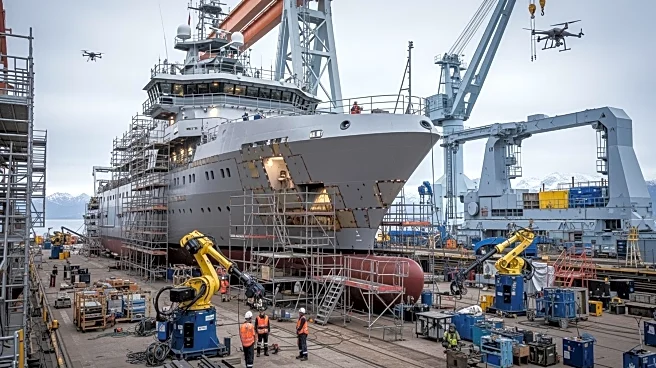What's Happening?
The National Oceanic and Atmospheric Administration (NOAA) has awarded a $95 million contract to JAG Alaska, Inc., an Alaskan shipyard, for the mid-life renovation of the research vessel Oscar Dyson. This initiative aims to enhance NOAA's operational
readiness and contribute to Alaska's economy by creating skilled jobs. The renovation will feature Siemens Energy's SISHIP BlueDrive PlusC low-voltage direct current propulsion system, which is designed to improve fuel efficiency and reduce emissions. The Oscar Dyson, commissioned in 2005, plays a crucial role in fisheries surveys and ecosystem assessments in Alaskan waters. The upgrades will include advanced generators, quiet air conditioning motors, improved fire detection systems, and additional single-occupancy staterooms, all intended to boost operational efficiency, scientific capabilities, and crew comfort.
Why It's Important?
This investment by NOAA is significant as it not only enhances the operational capabilities of the Oscar Dyson but also aligns with NOAA's sustainability goals by setting a new standard for energy-efficient research vessels. The project supports local economic growth by creating jobs in Alaska, demonstrating the positive impact of government investment in regional economies. Furthermore, the renovation ensures that NOAA continues to lead in ocean research, reinforcing its commitment to sustainable maritime science. The collaboration between NOAA, Siemens Energy, and JAG Alaska, Inc. exemplifies the power of combining local expertise with global innovation.
What's Next?
During the Oscar Dyson's yearlong maintenance period, NOAA plans to modify the NOAA Ship Bell M. Shimada to operate in colder climates, ensuring uninterrupted data collection for Alaska's critical fisheries. The Oscar Dyson is expected to be ready for the 2028 field season, marking a significant milestone in NOAA's efforts to maintain its leadership in ocean research. The successful completion of this renovation could set a precedent for future upgrades of research vessels, further advancing NOAA's sustainability and operational goals.
Beyond the Headlines
NOAA's investment in the Oscar Dyson renovation highlights the broader implications of sustainable practices in maritime science. By integrating advanced propulsion technology, NOAA is not only reducing the environmental impact of its operations but also setting a benchmark for other research institutions. This initiative underscores the importance of government-industry collaboration in achieving long-term sustainability goals, potentially influencing policy decisions and encouraging similar investments in other sectors.

















